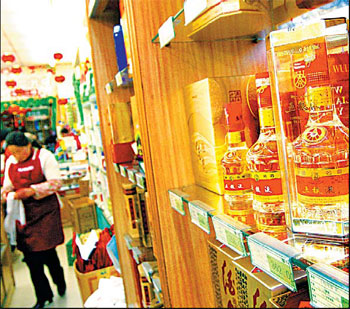Feeling the pinch of the global grain price rise, many Chinese spirits makers are raising, or considering raising, prices of Chinese liquor baijiu.
Market leaders such as Kweichow Moutai and Wuliangye have already raised prices of some products several times this year. Some smaller and regional liquor makers are now following in their footstep. The price increases usually range from 10 to 30 percent.
Tuopai Qujiu, a liquor maker based in Sichuan, on Monday announced that it would increase the price of its Shede series by 10-15 percent. The company attributed it to inflation, which has pushed up production and operating costs.
Grain is the major raw material for liquor distillation. Experts say it takes 3 kg of grains to

make 1 kg of common baijiu, while 1 kg of high-end baijiu is distilled from 5 kg of grains or more. Therefore the spikes in grain prices have a major impact on liquor makers.
Other costs such as packaging material and transportation are also on the upswing, which have contributed to the price rise as well.
But some analysts said the price increase could just be a ploy for some liquor companies to increase their margins. "Profit margins of high-end liquors are very high and not very sensitive to costs," a report by Merchant Securities said.
| Baijiu on sale at a supermarket in Nanjing, Jiangsu province. |
According to first-quarter statistics, market leaders in the baijiu sector such as Wuliangye and Moutai are doing well. Moutai's revenue in the first quarter this year went up over 25 percent and its profit increased by nearly 63.3 percent to 917 million yuan.
According to the report by Merchant Securities, the rise of Moutai profit can be attributed to its increased prices and a reduced tax rate under the new tax law. Prices of common Moutai products went up by 30 percent and some even went up by as much as 75 percent.
But analysts warned that rising costs may put some smaller enterprises in a more difficult position. Middle and low-end liquor makers with a much smaller profit margin are often more sensitive to grain price swings.
"They will have to increase prices to deal with rising costs," said Yu Qiao, an industry analyst. "Whether they can adapt to the market will be finally decided by their brand positioning and quality."
(China Daily May 7, 2008)